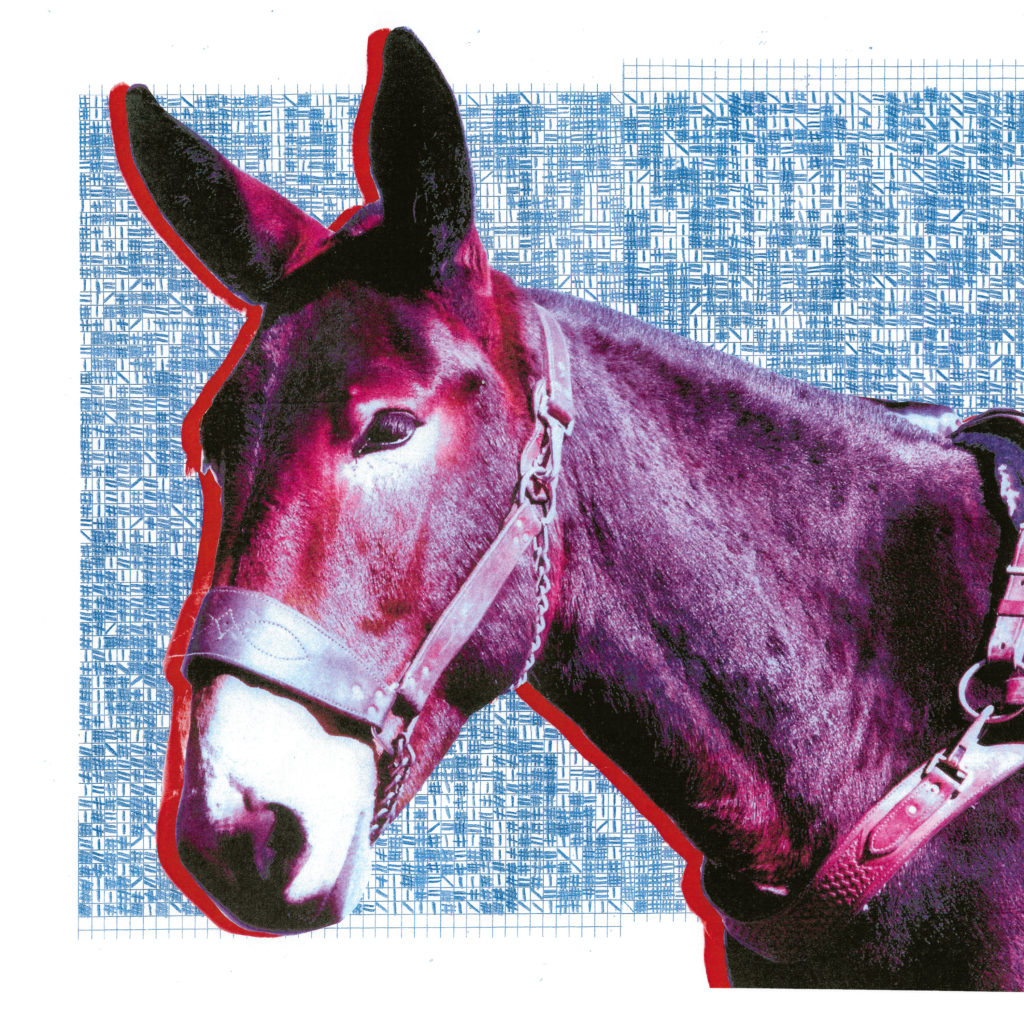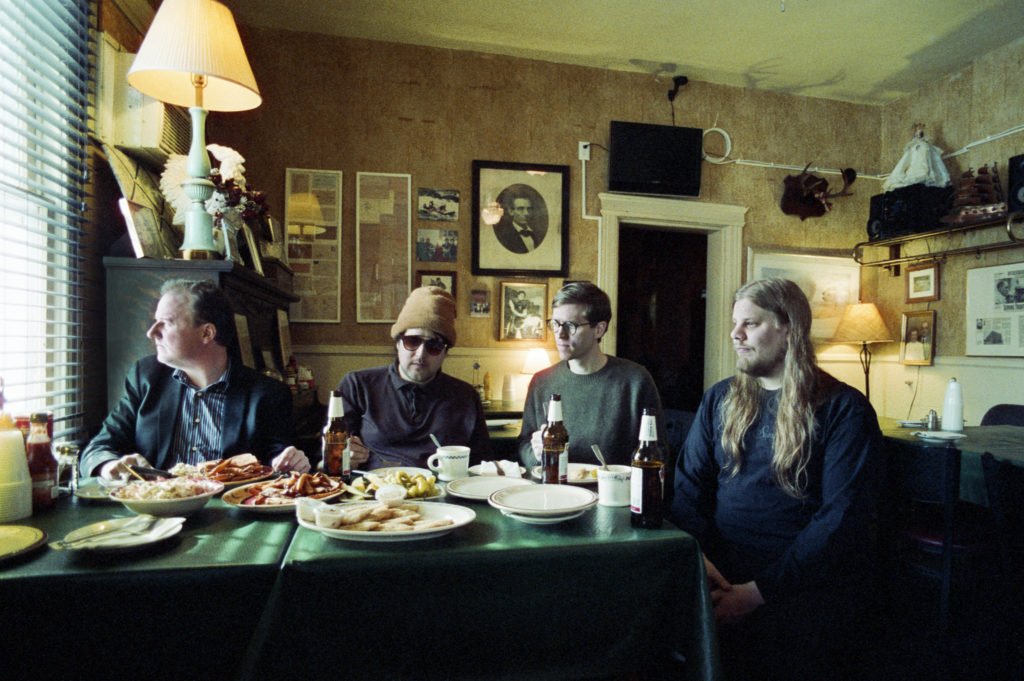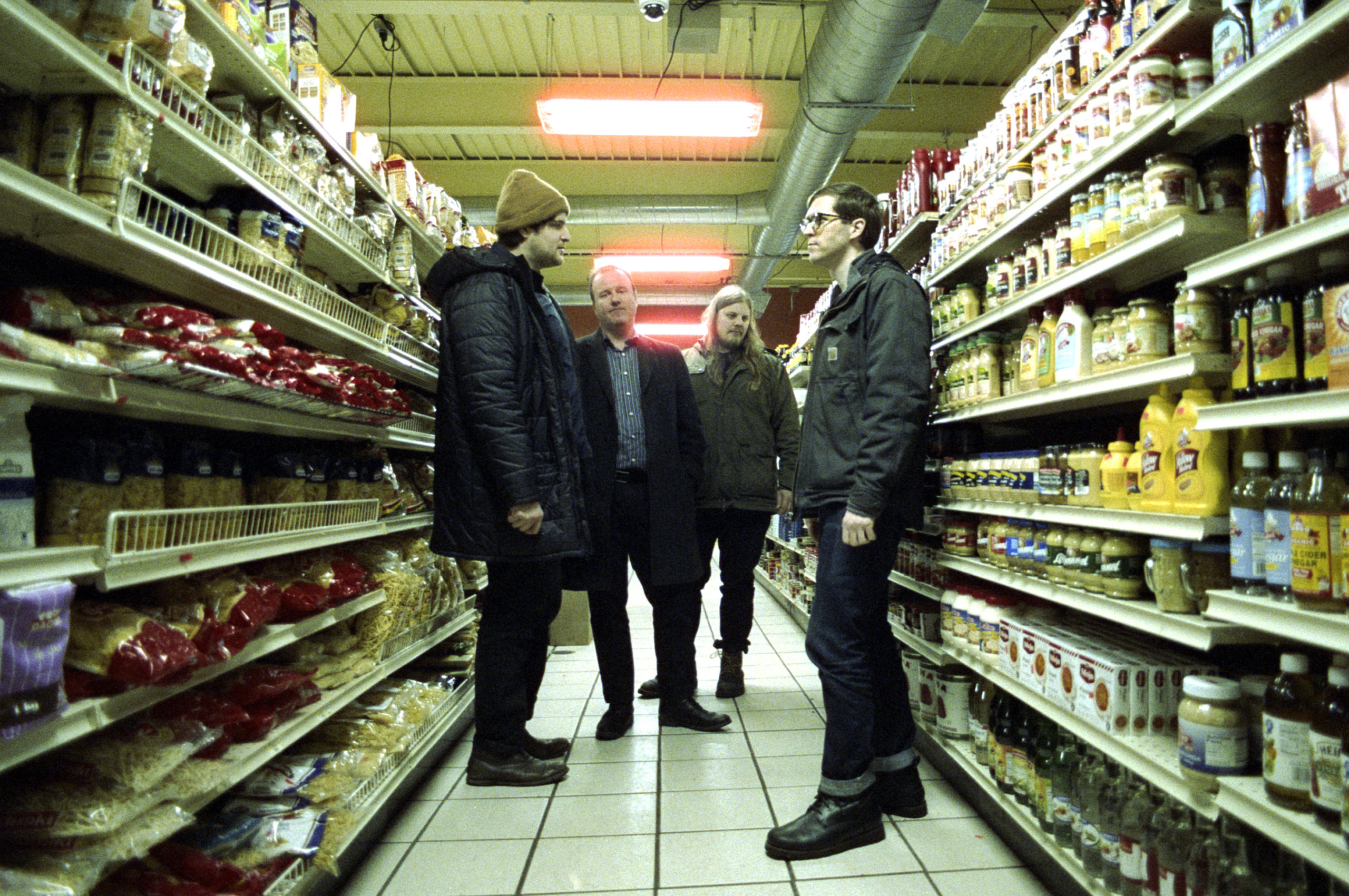Foto Credits © Trevor Naud
Einige Musiker ärgern sich darüber, dass alles umsonst war. Sie haben über längere Zeit ein Album geschrieben und produziert, nun ist wegen Covid-19 alles anders. Die Stimmung hat sich geändert und entspricht nicht mehr der während der Aufnahme. Protomartyr haben dieses Problem nicht. Ihr Grundvorteil ist, dass sie die Welt, in der wir leben, sowieso von Grund auf scheiße finden. Selbst durch eine Pandemie könne das Exkrement namens Existenz nicht mehr verschandelt werden, finden sie. Von Selbstaufgabe aber keine Spur. Die Energie, sich als Musiker gegen den Dreck zu wehren, ist immens. Sänger Joe Casey, Gitarrist Greg Ahee, Bassist Scott Davidson und Schlagzeuger Alex Leonard kommen aus Detroit, wo seit Bandgründung im Jahr 2010 noch mehr Leute pleite und arbeitslos sind als anderswo auf der Erde. Als Reaktion kreieren sie einen grimmigen Post-Punk-Sound, der von Joy Division, The Fall oder Pere Ubu beeinflusst ist. Davon kann man nur begeistert sein, findet Iggy Pop. Für ihn sind Protomartyr die im Augenblick beste amerikanische Band. No need to argue.
Der Aufhänger des fünften Albums Ultimate Success Today ist an sich schon eine Machtdemonstration. In Processed By The Boys schreit die Gitarre widerborstig, groovt der Rhythmus gallig und geriert sich Casey wie ein Schalk im Nacken. „In their tatterdemalion uniforms they look so nice, tattoos of their children, so nice, so nice“, ätzt er über Jungs, die alles beherrschen und alle manipulieren. Auch sonst bleibt die Spannung hoch. Ahee orientiert sich mit aller Wucht am Noise-Rock, Gäste an Saxofon oder Klarinette weisen Wege zum Avantgarde-Jazz und Nandi Rose von Half Waif sorgt für zarte Kontrapunkte. Über allem steht Casey, der auch in Michigan Hammer und Tranquilizer aufpeitscht wie keiner sonst. Während der Corona-Pause hatten wir Gelegenheit, mit ihm am Telefon zu parlieren. Er erzählt von Tristesse und persönlichem Schmerz, aber auch von der Notwendigkeit, bei dem ganzen Übel nicht den Humor zu verlieren.
You have released Processed By The Boys as the first teaser to the album. Interestingly enough it starts with the lines: „When the ending comes, is it gonna run at us like a wild-eyed animal? A foreign disease washed upon the beach, a dagger plunged from out of the shadows“. Judging by that it seems you knew what was going to happen this year. Are you in possession of clairvoyant abilities?
(laughs) I hope not, because I mostly sing about depressing things that have already happened. I don‘t know if that‘s having any clairvoyant power. This song is more about how people handle…putting all your faith into…maybe the boys, the governments, the police to handle things benevolently. Usually that‘s not the case, there‘s a darker side…

The song deals critically with the times we are living in politically and economically. Compared to other bands who prefer a more abstract description you are very direct in Protomartyr. Do you feel it can only be like that in 2020, that there‘s no other way?
It‘s never a plan to set out that this is going to be the song that‘s about this or that. I don‘t have a list of the world‘s ills written out (laughs). Usually what happens is…the band comes up with some really interesting music and I have to come up with lyrics for it. I live a pretty simple life where not much is going on. It‘s not like I can plumb my own life for particularly interesting things to sing about. I don‘t have fascinating love life or a cumbersome spirit. When I‘m sitting at home alone I have to draw from what I see in the news or what I sense is happening to the city or the state or the world. I think if you‘re going to sing something it should be to match that tone of the music. It‘s better than to sing about something serious sometimes as opposed to being sad because a girl dumped you. But saying that, you don‘t ever want to come off just spouting slogans or something serious, so that you can‘t have some humor. You can get stuck in a rut. It‘s not like the world is all of a sudden going to get better tomorrow and you find yourself writing about politics for the rest of your life. I don‘t know whether that necessarily would be a good way forward for the band. But for now it seems to makes sense.
The music Protomartyr are making is described as post punk, a genre that is very serious and dark. But then there‘s also light at the end of the tunnel in a peaceful song like Worm In Heaven. Do you want to be more than just a continuum of a classic punk band?
Yeah, something you have to fight against is that sort of stereotype of the doom and gloom, always standing out in the rain…(laughs). When we were hearing ideas for the video of the song a lot of the ideas pitched to us was something dark and depressing. After getting all these ideas we said we have some friends that can do something more comic or comedic, and we wanted to make use of that. You can fall into the post punk trap where you start thinking that everything needs to be very serious. We want to make sure there‘s some nuance and some light in there, it allows the songs to go in different places. We wanted the last song to be this release, because we‘re often accused, probably correctly, of building tension in our songs and never quite having any sort of cathartic release. The things are constantly winding tighter and that can be stressful. I think Worm In Heaven is like an exhalation almost.

Unfortunately you had trouble finding breathing space yourself according to the press statement given for this album. You are quoted as saying: „When it came time to write Ultimate Success Today, I was reminded of that first urgency and how it was an inverse of my current grapple with how terribly ill I’ve been feeling lately.“ Can you be a bit more elaborate on how your state of mind affected the making of the record?
Sure. There‘s always a moment right when we start writing a record, when Greg and the band are first starting to work on music. I usually have an idea what I want to write about, but it never ends up that way. This time I think I wanted to write a summer record – a very Protomartyr summer record, not like The Beach Boys, mind you! While writing the lyrics I‘m always affected by my mental state or what‘s going on with me. This time I was feeling ill all the time and I couldn‘t…I personally have a fear of doctors and I personally at that time didn‘t really have health insurance. But the sickness was affecting my mental state…am I dying?…what is this?…you know…is it just because I‘m getting older?
Did you suffer from too much stress?
We had just finished two years of straight touring, that takes a lot out of you. I was struck profoundly about how much my mental state can change based on your physical power. When you‘re actually in physical pain your brain immediately shuts off, your brain does become very animalistic and responds to the pain, and so I‘m like…going through this as we‘re writing a record, this is going to be in this record, it will be a record of some of this physical pain. And I really needed to go to the doctor, despite my inner resistance.
Do you have a diagnosis?
No, not yet. I had the money and the insurance to go and finally see the doctor, but it might be wiped out by all of this, by Covid-19 and so forth. I‘m feeling better than I was when we were writing and recording the record, so that‘s a good thing.

There are songs on the album that seem to cover the pain thematically, like The Aphorist and Tranquilizer.
It‘s starting from the first song Day Without End, it‘s a pretty constant theme. The Aphorist is this classic song about writing songs and what it means, whether you‘re writing what you think is the truth or kind of obscuring things to protect yourself. I see it as a sequel to My Children, which was the song about writing songs on the last record. This one is The Aphorist. And, of course, with Tranquilizer I really wanted to capture that mood of going through pain to the release of taking some medicine to delve the pain and this thing on your mind that is firing off wildness. The band had such an interesting groove and I thought this is the one where I‘m going to turn my brain off and hopefully engage it in a more visceral way.
Let‘s go back a bit. Your song Windsor Hum on Relatives In Descent is based on a local story. People in Canada, on the other side of Detroit River, were annoyed by a strange nagging noise coming from Detroit. It was bad, it even affected their ability to sleep. Have they found a way to stop the noise in the time after the song was released?
Last thing I heard…and I should probably keep up with it…is that the plant on the Detroit side that was caught causing it…I believe it closed down for a while. I think the company might have gone bankrupt, it might have stopped because on Zug Island that plant closed down. I don‘t know if it‘s gonna re-open. I need to check that out. They were assuming what was causing it was this smelting plant on the Detroit side. It‘ll be interesting to see if that went away. Maybe if it didn‘t it‘s something supernatural.
I first thought it was the fault of the Trump administration…
We just found out that the EPA, the Environmental Protection Agency, can‘t police anybody because of the Coronavirus. They basically said that polluters can pollute freely during all this. I thought it was a pretty weird thing to get rid of right off the bat, but that‘s them over there in DC…(groans)

One of the new songs is named after the Michigan Hammer, which apparently is a tool you can use in cars or households. Or is it a weapon against all the nastiness in the world?
(laughs) Since I‘ve written the song I looked it up and found out that there are people who call themselves Michigan Hammers, it‘s a soccer fan club. But I wanted to write a song about something that could also have reference to Detroit‘s and Michigan‘s labour history. Often a fight song can dip into cheesiness and I wanted to make sure it wasn‘t too much of an anthem. I wanted it to be more down-to-earth. What Michigan and Detroit used to represent was the dignity of the worker and the dignity of the job. It was the birth of the American middle class, and that hasn‘t been that way for a long time even before I was born. It is harkening back to that day and hoping that we can maintain it. A lot of people I know in Detroit right now are currently out of a job and we‘ll see how this affects us.
The new album was recorded at the Dreamland Sound studio in NY state. Jemeel Moondoc is playing the alto sax and Nandi Rose of Half Waif is singing on June 21. The vocal style in Tranquilizer is similar to rapping. Are you trying to broaden your style with the help of other people and instruments?
Yeah, with Greg the big thing was that he wanted to bring in more collaborators. We‘ve had guests on the albums in the past, but then it‘s all been kind of an afterthought, like…oh Olivier from France, he can add some keyboards! This time we knew ahead of time that Greg wanted to collaborate, and it was interesting because there were different levels of it. Isaac, who did a lot of the clarinet and some saxophone, is all over the album, almost on every single song. Jemeel came in for one day was able to be on two songs, it was a quick one. Nandi Rose we never even met, she is a friend of the producer and was able to do all her stuff over the computer. She added so much, she‘s on more songs than you think, at least three or four doing backing vocals. It was to fulfill Greg‘s original crazy idea – oh yeah, we can have all these people come in and really shape the song. Tranquilizer is our friend Cory from the band Spray Paint. He came in and added vocals and completely changed the temperature of the song. I like the fact that it still sounds like Protomartyr, except it has all these wonderful extras.
Das Interview mit Protomartyr führte unser Redakteur Tom Whelan.









